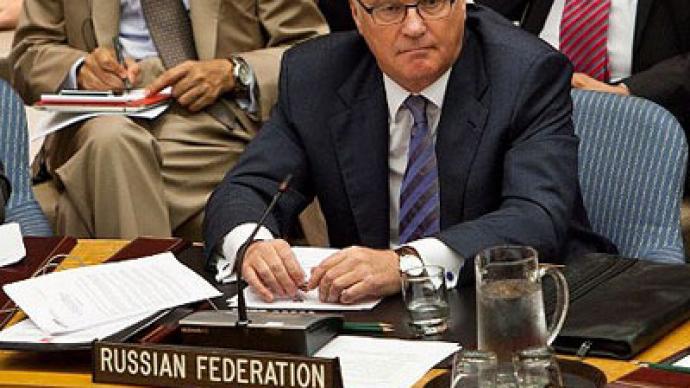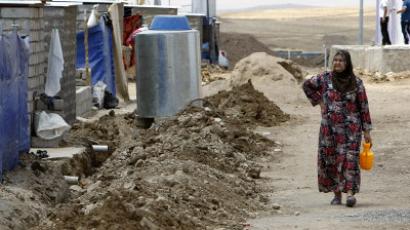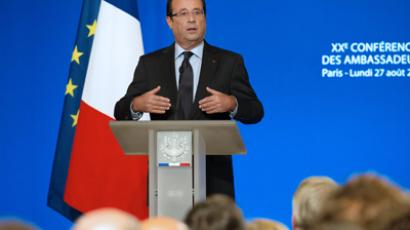Humanitarian aid to Syria must be neutral - Russia's UN ambassador

Some of the proposals for solving the humanitarian crisis in Syria voiced at a United Nations Security Council meeting Thursday do not fully comply with the principles of neutrality and impartiality, Russian envoy Vitaly Churkin said.
The central concern in implementing humanitarian activities in Syria is full impartiality and neutrality, in accordance with international law, Churkin said in an address to the Security Council.“Let us put this directly: not all of the ideas voiced here are in line with these criteria,” he said. “We consider the efforts of individual states to use humanitarian arguments to justify the financial, technical and logistical support to illegal armed groups as unacceptable.” The Security Council remains very much divided over how to deal with the Syrian crisis. The high-level meeting in New York focused on the humanitarian circumstances in Syria and how their continuing deterioration.Recent trends in humanitarian development in Syria can only spark deep concern, Churkin said, reiterating that both sides of the conflict are contributing to its severity.“Responsibility for the plight of simple citizens is borne by both sides of the conflict,” he said. “We call upon the Syrian leadership and the leaders of the opposition, including the armed opposition, to prevent the deterioration of the humanitarian situation.”Churkin also raised the issue of the unilateral sanctions imposed on Syria by Western governments including the US, Britain and France. He said the sanctions hurt normal Syrians, and could be making already bad matters for them even worse.“These sanctions, imposed in circumvention of the UN Security Council, have nothing in common with actual efforts to assist in the settlement of the Syrian crisis,” he said. “They simply complicate the life of simple citizens and deny them the opportunity to meet their elementary needs and fully enjoy basic human rights.”Meanwhile, the US has reiterated its commitment to toppling the government of Bashar al-Assad, with US envoy to the UN Susan Rice saying that “the United States and its partners will continue to work with the opposition.”“This is not at root a humanitarian crisis,” she said. “It is a political crisis caused by the callousness and cruelty by the Assad regime. No amount of humanitarian assistance will end the bloodshed and suffering. That day will come only once Assad has departed and a peaceful Syrian-led transition to democracy has begun.”According to UN officials, at least 229,000 Syrians have fled the country in the past 18 months, spilling over to neighboring Lebanon, Jordan, Turkey, Iraq and other countries.Turkey has asked the Security Council to consider setting up humanitarian buffer zones inside Syria, refugee camps that would be guarded by neighboring countries. The Syrian government, however, is opposed to the suggestion, and UN refugee chief Antonio Guterres warned as well that it is “rarely possible to provide effective protection and security in such areas.”Russia and China have also opposed the idea of buffer zones, saying that they would only worsen violence in the country. Even UN Deputy Secretary-General Jan Eliasson cautioned that the proposal would "raise serious questions and require careful and critical consideration." Meanwhile, Britain and France say they are not ruling out any options for solving Syrian crisis, including a military-enforced no-fly zone.
Buffer zones cover for intervention?Turkey's appeals to the UN Security Council for a safe haven for Syrian refugees has caused division in the international community, with some saying it could turn into a rebel command center.Colonel Doug Macgregor, a decorated US combat veteran and author, told RT that Ankara's move to intervene could force other key players to get involved.“Based on our experience in Libya, this would have to be effectively a US-based operation,” he said. “The Europeans do not have the capabilities that we do. I don’t really see it happening. It would have to be a very expensive proposition. If NATO becomes involved in the circumstances, I can only imagine what it would be if the Turks themselves finally decide to intervene."Turkey said that it would take no more than 100,000 refugees, and by the end of September, given the current rate, that number will be settled in Turkey, Macgregor says.“The Turks will want these people to be resettled in Syria,” he said. “That may be the tipping point for the intervention of the Turkish military establishment.”Professor Paul Sheldon Foote of California State University, who specializes in Middle Eastern affairs, believes the US and its allies are using the humanitarian situation in Syria to pursue their agenda in the region.“It is a pretext – it is still another way to divide and take over the country using the United Nations as a vehicle,” he said. “It is unfortunately a repetition of what happened in Libya, where we had the United Nations being used to promote war instead of promote peace.”














